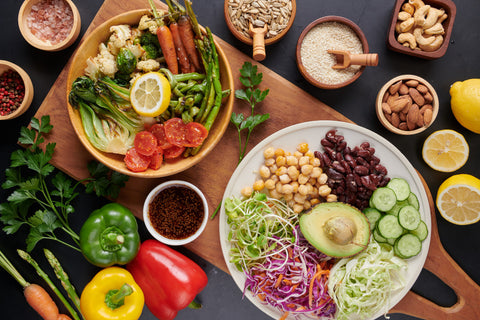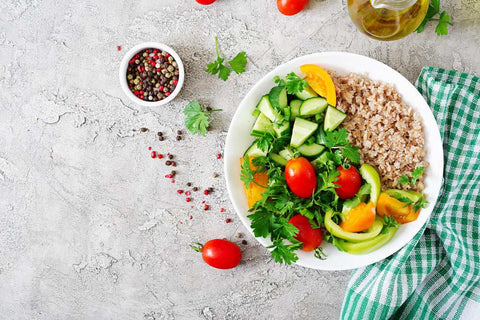7 Ways To Avoid Deficiencies On A Vegan Diet


Diversify your vegan diet and live a healthy life

Vegan diets rely on fruits, vegetables, grains, nuts, and their products. Vegan Diets have been adopted throughout the world due to their health benefits, e.g., vegan diets are low in saturated fats and cholesterol and also a rich source of minerals and vitamins.
But, can a vegan diet fulfil all of your nutritional requirements? Can you rely entirely on a vegan diet? Are there any dangers of nutritional deficiencies? To understand this, you should know the dietary needs of your body.
You may also use a test to check your overall nutrient levels, to see our Vegan Blood Test, click here.
Your nutritional requirements are quite diverse. Nutritionists recommend the use of a balanced diet having all the essential vitamins and minerals that the body requires for functioning.

Broadly, your body needs the following macronutrients;
● Proteins as a source of essential amino acids
● Healthy fats as a source of fatty acids and good cholesterol, e.g., dairy products and fish oil
● Carbohydrates (sugars and dietary fibre) as a quick source of energy, e.g., whole grains etc...
● Minerals, e.g., calcium, magnesium, zinc, phosphorus etc...
● Vitamins, e.g., Vitamin C, Vitamin D etc...
The first three nutrients provide energy to your body. The most sensitive nutrients are minerals and vitamins. Although you need them in minute quantities, they are an important requirement for the functioning of the organs.
Animal products are rich in nutrients that are sometimes deficient in plant-based diets. Plant-based foods also have a lower absorbability as compared to animal-derived foods. Hence, it is important to get a blood test regularly if you think you might have a deficiency.
The typical nutritional deficiencies identified in plant-based foods are.,
● Vitamin B12
● Iron
● Iodine
● Vitamin D3
● Omega 3 fatty acids
● Calcium
● Vitamin B9 (folate)
Dieticians recommend using vitamins and mineral supplements for those individuals who may have certain deficiencies. Let's discuss how you can avoid deficiencies of these nutrients on a purely vegan diet.
Click here to see our Vitamin Deficiency Test.
According to the NHS, the daily requirement of vitamin B12 for a healthy adult is 1.5 mcg. Our bodies can't synthesise it, and we have to rely on our food for it. It is vital for our red blood cells and nervous system.
The primary dietary sources of vitamin B12 are dairy and other animal products. Vegans may have a deficiency of Vitamin B12 as the diet does not include milk or other animal-derived products. An individual with a vegan diet can add the following elements to his diet to avoid the deficiency of vitamin B12:
● Fortified cereals
● Almond and soy milk
● Yeasts and yeast spread, e.g., marmite.
Various vitamin B12 fortified foods are also available.
Click here to see our B12 blood test.
The daily folate requirements of an individual are 400-600 mcg DFE (DFE- dietary folate equivalent). Pregnant women and breastfeeding mothers need an amount of folate towards the upper end of the range. This vitamin is necessary for various functions in the body, e.g., formations of red cells and proper development of neural tubes in the fetus. It is also required for the growth and maintenance of cells and the synthesis of DNA.
You can include these foods in your diet to avoid any Vitamin B9 deficiency.
● Lentils and beans
● Seeds and nuts
● Fruits, e.g., oranges, lemons, bananas
● Leafy greens, e.g., spinach
● Vegetables, e.g., avocados, asparagus and broccoli
In short, expand your horizon of vegetables and fruits to avoid folate deficiencies.
Vitamin D deficiency has no link to a vegan or plant-based diet. It is one of the most common deficiencies globally. However, plant-based foods may not contain high amounts of Vitamin D that can be absorbed by the body. Vitamin D is required for healthy bones, muscles and teeth. It is also required for the proper functioning of the immune system. Luckily, your body can synthesise vitamin D in the sunlight. Typically, sunlight can produce your daily requirement of 10 mcg.
But what if you are living at the north pole? The sunlight is rarely enough for any synthesis of vitamin D. Similarly; you may not get enough sunlight during the winter. In these cases, it is recommended that you use vitamin D supplements to provide you with the daily requirements.
To see our Vitamin D test, click here.
What!! Do you need iron? Exactly. Iron is needed to synthesise haemoglobin, the primary carrier of oxygen in your blood. All the iron in your body could add up to a small-sized nail (0.8-1 gram).
Luckily, you don't need any supplements to cover the iron deficiency. Some vegetables are naturally rich in iron. The iron obtained from plant sources is known as non-heme iron. You have to add them to your vegan diet. Here is a list of iron-rich foods. These foods also enhance iron absorption when taken with an iron supplement.
● Dry fruits, e.g., raisins, figs and apricot.
● Seeds and nuts, e.g., chia seeds, ground linseeds, pumpkin seeds and cashew nuts
● Dark green leafy vegetables, e.g., kale and spinach
● Legumes, e.g., soybeans, chickpeas and lentils.
Just add these to your diet and have complete requirements of iron.
To see our Iron Blood Test, click here.
Calcium hardens your bones and makes your muscles contract and relax. Without it, your bone health will be compromised (osteoporosis) and at an increased fracture risk. Your teeth also have calcium. Without calcium, your teeth will not be normal. A severe deficiency of calcium (hypocalcemia) can cause convulsions, changes in heart rhythms, numbness in fingers and reduced function of muscles.
Although they are found abundantly in animal foods, many plant-based foods can provide calcium. For example.,
● Soy products
● Brussels sprouts
● Broccoli
● Mustard greens
● Beans and peas
● Chard
● Collard
Add these to your diet. However, if you are a picky eater, you may still have to use a calcium supplement with a vegetarian diet to provide your daily one gram of calcium.
The thyroid gland in your neck converts the iodine into two critical hormones which regulate the metabolism.
Triiodothyronine T3
Tetraiodothyronine T4
Your body needs 150mcg of iodine daily to produce these hormones. As the body can't make it, you have to rely on the diet for iodine. Else, you might see persisting symptoms of iodine deficiency, e.g., goitre (swelling on the neck), fatigue, intolerance to cold and abnormal weight gain.
To avoid being iodine deficient, you have to add the following sources to your diet.
● Potatoes
● Seawood
● Iodised salt
● Cranberries
● Prunes
● Soy milk
However, if you are diagnosed with iodine deficiency, a proper iodine supplement is required.
Your body needs the following three Omega-3 fatty acids.
Alpha linolenic acid (ALA)
Eicosapentanoic acid (EPA)
Decosahexanoic acid (DHA)
The deficiency of these fatty acids can cause rashes, scales and dry patches on your skin.
Your body can convert ALA to other two forms. Therefore, some people use supplements with ALA only. However, this conversion rate is too low, and it has more risks than benefits. So, supplements containing all three omega 3s should be used. You can add the following food items to your diet to add omega 3s.
● Nuts, e.g., walnuts
● Fortified foods, e.g., juices
● Plant oils
● Seeds, e.g., flax or chia seeds.
Algae is also a rich source of EPA and DHA.
To see our Omega 3 & 6 Blood Test, click here.
Your vegan or vegetarian diet should be a perfect partner for you. You have to add a variety of different food groups to your diet. Try to add as many vegetables and fruits as possible to avoid nutritional deficiencies. Plant oils and seeds are necessary for you too. The above suggestions will help you make the most of your vegan diet and reduce the risk of heart disease. However, foods fortified and supplemented with vital nutrients are the only choice for severe deficiencies.
To see our Vegan Blood Test, click here.
For a full range of medications, visit our Welzo Online Pharmacy Page. For more details click here.
Plus get the inside scoop on our latest content and updates in our monthly newsletter.